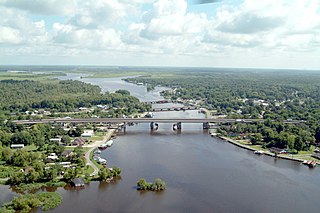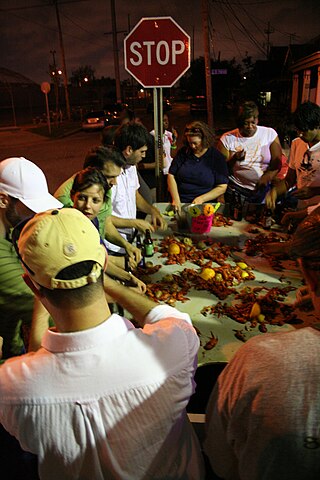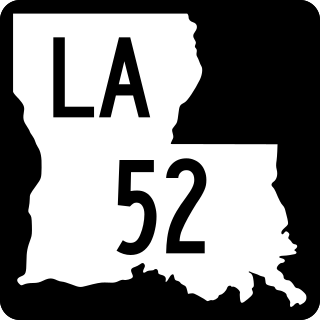Related Research Articles

Cajun cuisine is a style of cooking developed by the Cajun–Acadians who were deported from Acadia to Louisiana during the 18th century and who incorporated West African, French and Spanish cooking techniques into their original cuisine.
Luling is a census-designated place (CDP) in St. Charles Parish, Louisiana. The population was 11,512 at the 2000 census and 12,119 at the 2010 census. At the 2020 census, 13,716 people lived in Luling. It is located on the west bank of the Mississippi River. Luling is part of the New Orleans—Metairie—Kenner metropolitan statistical area.

Des Allemands is an unincorporated community and census-designated place (CDP) in Lafourche and St. Charles parishes in the southeastern part of the U.S. state of Louisiana. The population was 2,179 at the 2020 census. The town, known as the "Catfish Capital of the Universe", is along the Bayou des Allemands, which is the boundary of Lafourche and St. Charles parishes. Lac des Allemands is located northwest of the town. The ZIP code for Des Allemands is 70030.

St. Charles Parish is a parish located in the U.S. state of Louisiana. At the 2020 census, its population was 52,549. The parish seat is Hahnville and the most populous community is Luling.

Yum cha is the Cantonese tradition of brunch involving Chinese tea and dim sum. The practice is popular in Cantonese-speaking regions, including Guangdong province, Guangxi province, Hong Kong, and Macau. It is also carried out in other regions worldwide where there are overseas Cantonese communities. Yum cha generally involves small portions of steamed, pan-fried, or deep-fried dim sum dishes served in bamboo steamers, which are designed to be eaten communally and washed down with hot tea. People often go to yum cha in large groups for family gatherings and celebrations.

Rocky Mountain oysters or mountain oysters, or meat balls, also known as prairie oysters in Canada, is a dish made of bull testicles. The organs are often deep-fried after being skinned, coated in flour, pepper and salt, and sometimes pounded flat. The dish is most often served as an appetizer.

A po' boy is a sandwich originally from Louisiana. It traditionally consists of meat, which is usually roast beef, chicken fingers, or fried seafood such as shrimp, crawfish, fish, oysters, or crab. The meat is served on New Orleans French bread, known for its crisp crust and fluffy center.

Interstate 310 (I-310) is a short spur route of I-10 west of New Orleans, located entirely in St. Charles Parish, Louisiana. It begins at a point on I-10 just west of Louis Armstrong New Orleans International Airport and the city of Kenner. It travels southward as an elevated freeway across the LaBranche Wetlands and intersects U.S. Route 61 (US 61) in St. Rose. The highway crosses the Mississippi River from Destrehan to Luling via the Hale Boggs Memorial Bridge. After a brief concurrency with Louisiana Highway 3127 (LA 3127), I-310 terminates at US 90 in Boutte.

The Hale Boggs Memorial Bridge is a cable-stayed bridge over the Mississippi River in St. Charles Parish, Louisiana. It is named for the late United States Congressman Hale Boggs.

Seafood boil in the United States is the generic term for any number of types of social events in which shellfish, whether saltwater or freshwater, is the central element. Regional variations dictate the kinds of seafood, the accompaniments and side dishes, and the preparation techniques. In some cases, a boil may be sponsored by a community organization as a fund-raiser or a mixer. In this way, seafood boils are like a fish fry, barbecue, or church potluck supper. Boils are also held by individuals for their friends and family for a weekend get-together and on the holidays of Memorial Day and Independence Day. While boils and bakes are traditionally associated with coastal regions of the United States, there are exceptions.

Louisiana Highway 18 is a state highway that serves Ascension, St. James, St. John the Baptist, St. Charles, and Jefferson Parishes. Called the Great River Road, it runs from west to east, parallel to the west bank of the Mississippi River, running from Donaldsonville to Gretna. It spans a total of 79.7 miles (128.3 km). In the more rural parts of LA 18's span, it is commonly referred to as River Road, but it becomes 4th Street once it enters Westwego.

The Natchitoches meat pie is a regional meat pie from northern Louisiana, United States. It is one of the official state foods of Louisiana.

Louisiana Highway 52 (LA 52) is a state highway located in St. Charles Parish, Louisiana. It runs 2.74 miles (4.41 km) in a north–south direction along Paul Maillard Road from U.S. Highway 90 (US 90) and LA 633 in Boutte to LA 18 in Luling.

Dried shrimp are shrimp that have been sun-dried and shrunk to a thumbnail size. They are used in many East Asian, Southeast Asian and South Asian cuisines, imparting a unique umami taste. A handful of shrimp is generally used for dishes. The flavors of this ingredient are released when allowed to simmer.
The culture of Louisiana involves its music, food, religion, clothing, language, architecture, art, literature, games, and sports. Often, these elements are the basis for one of the many festivals in the state. Louisiana, while sharing many similarities to its neighbors along the Gulf Coast, is unique in the influence of Louisiana French culture, due to the historical waves of immigration of French-speaking settlers to Louisiana. Likewise, African-American culture plays a prominent role. While New Orleans, as the largest city, has had an outsize influence on Louisiana throughout its history, other regions both rural and urban have contributed their shared histories and identities to the culture of the state.

Royd Anderson is a Cuban-American filmmaker and historian based in New Orleans, Louisiana. He specializes in documentary films pertaining to tragic Louisiana events often overlooked by historians.

Alligator meat is the meat from alligators that is for consumption. It has been used both historically and in contemporary times in various cuisines of the Southern United States. Alligator eggs can also be consumed. Alligator meat is high in protein and low in fat, and has a mild flavor and firm texture.
The Luling–Destrehan Ferry was a ferry across the Mississippi River in the U.S. state of Louisiana, connecting Luling and Destrehan. The ferry was one of three routes then operated by the Louisiana Department of Highways, District 2. The others were the pedestrian Taft–Norco Ferry and the vehicle Edgard–Reserve Ferry. The ferry ceased operation in October 1983 with the opening of the Luling-Destrehan Bridge.
References
- ↑ Ames, Don (2009-09-25). "Gators galore this weekend". WWL.
It's the 30th Annual Alligator Festival in Luling.
- ↑ "Alligator Festival". alligatorfestival.org. 2016-01-02. Archived from the original on 2016-01-14. Retrieved 2016-01-03.
- ↑ "Alligator Festival will make a splash in Luling". theneworleansadvocate.com. 2016-01-02.
- ↑ "Alligator Festival makes a comeback". The Times-Picayune. 2006-09-21.[ permanent dead link ]